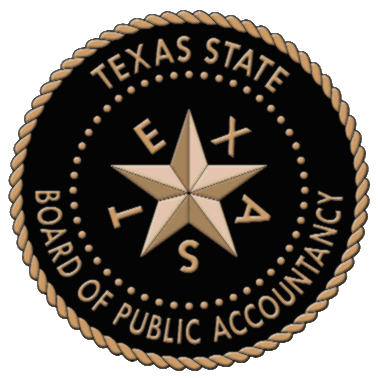Programs Operated by the Board
The Texas State Board of Public Accountancy has the responsibility and authority to regulate the practice of public accountancy in Texas. This is accomplished through the following means:Licensing and Qualifications
Evaluation – Under Section 901.302 of the Public Accountancy Act, the Board evaluates the education and background of individuals who desire to take the Uniform CPA Examination. The evaluations are completed throughout the year, and applicants are informed of educational deficiencies that need to be completed before they apply to take the examination.
Qualifications - The Board, in conjunction with the American Institute of Certified Public Accountants (AICPA), the National Association of State Boards of Accountancy (NASBA) and Prometric, offers the Uniform CPA Examination on a year-round basis at various testing centers throughout the state. Only applicants who were determined by the Board to be eligible to test may schedule and take the CPA examination. Eligibility is reassessed with each application submitted to the Board.
Certification - The Board certifies:
- Applicants who have passed all sections of the Uniform CPA Examination in Texas and have met all other statutory requirements under Section 901.252 of the Public Accountancy Act for the CPA certificate in Texas; and
- Applicants who have passed all sections of the Uniform CPA Examination in another jurisdiction and transferred those sections to Texas under Section 901.258 of the Public Accountancy Act and have met all other statutory requirements under Section 901.252 of the Public Accountancy Act for the CPA certificate in Texas; and
- Individuals licensed as certified public accountants in other jurisdictions who wish to practice public accountancy in Texas and receive a Texas CPA certificate under Section 901.259 of the Public Accountancy Act (Certification Based On Reciprocity).
Registration - The Board requires registration of the following entities:
- professional corporations, partnerships, limited liability companies, registered limited liability partnerships, and sole proprietorships engaged in the practice of public accountancy; and
- eligible foreign applicants.
Licensure - The following entities must be licensed by the Board in order to lawfully practice public accountancy in Texas:
- certified public accountants;
- public accountants;
- eligible foreign applicants; and
- offices: professional corporations, partnerships, professional limited liability companies (PLLC), registered professional limited liability partnerships (PLLP), and sole proprietorships engaged in the practice of public accountancy.
Continuing Professional Education - CPAs are required to comply with the Board’s program of mandatory continuing professional education.
Sponsor Review Program - The sponsor review program is charged with ensuring that CPE sponsors are in compliance with the Board’s requirements. The program will monitor Board-registered CPE sponsors and their courses with the goal of emphasizing high quality education and compliance with professional standards.
Peer Review - The Board has promulgated rules governing peer review and has implemented a program whereby the work product of persons or firms practicing public accountancy is measured for adherence to quality control standards adopted by practitioners and the profession.
Enforcement
Enforcement - When an individual or firm licensed with the Board violates statutory provisions related to the practice of public accountancy or the Rules of Professional Conduct, the Board has the authority to take disciplinary action including but not limited to the revocation of the license or certificate and the imposition of civil and criminal penalties. The Board also has the authority to enforce specific statutory prohibitions against practicing or offering to practice public accountancy without a license.
